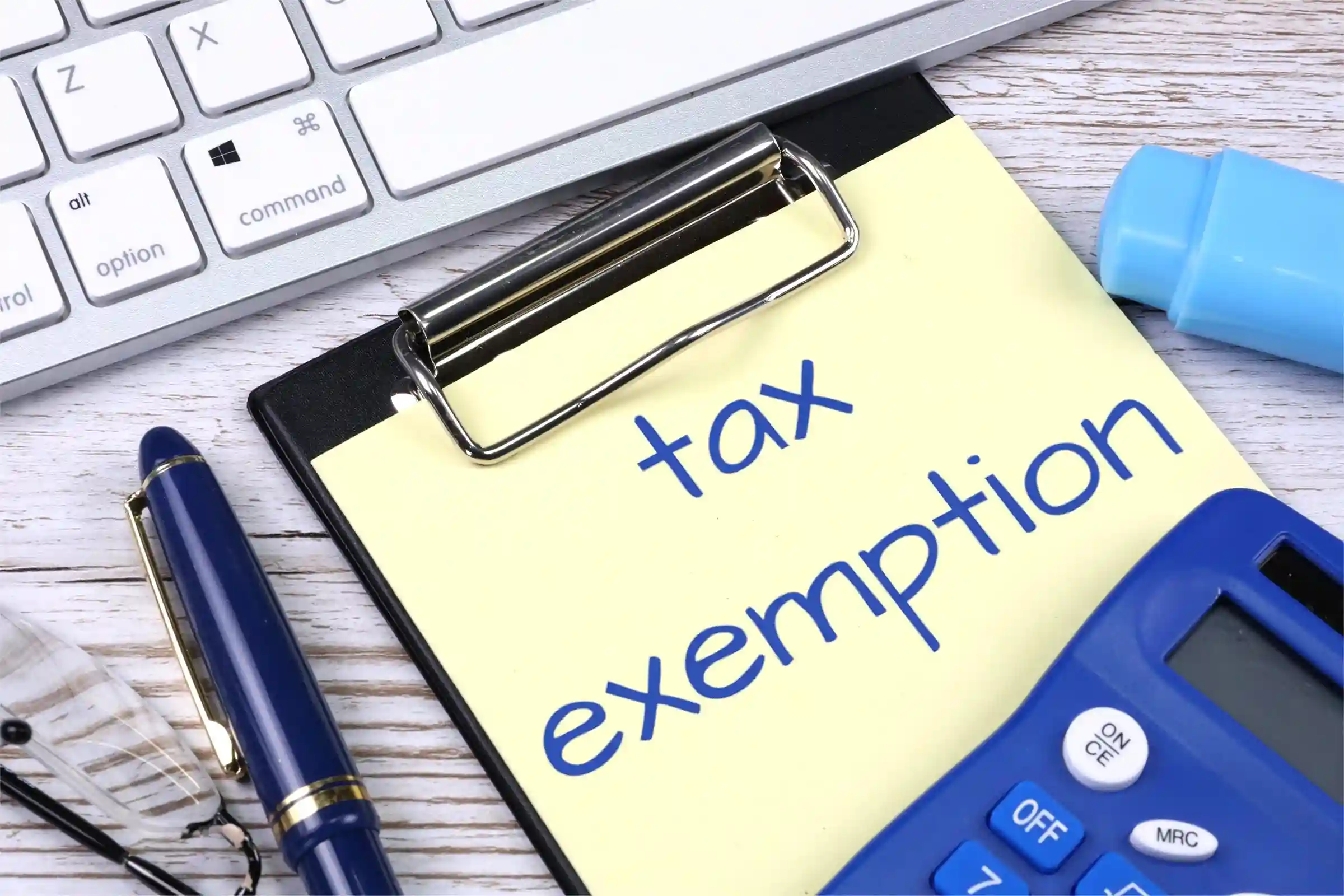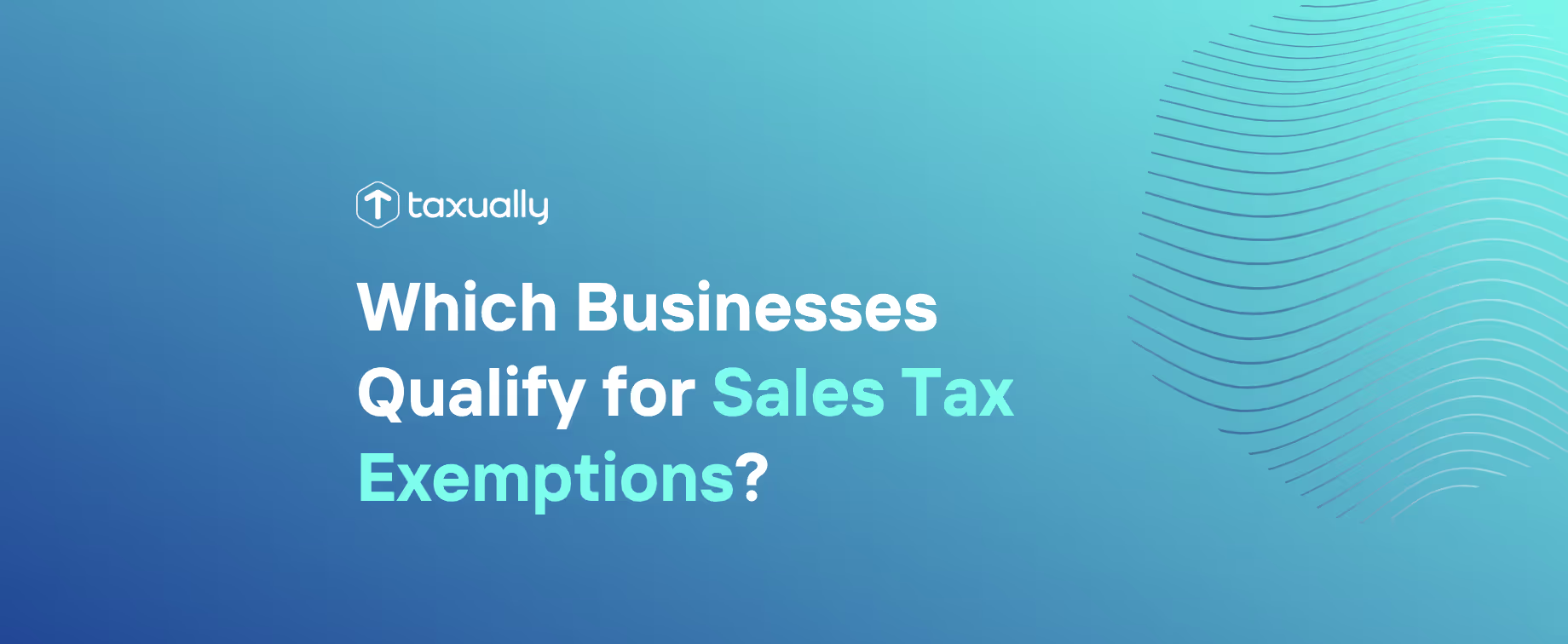Key takeaways
- Eligibility depends on who you are, what you buy, and how it's used—with resellers, manufacturers, governments, and charitable organizations often qualifying.
- A valid certificate is essential to avoid paying sales tax and stay compliant during audits—even if you’re making an exempt purchase.
- State rules vary widely—including forms, expiration dates, and definitions—so using tools like LumaTax can simplify exemption certificate management and reduce compliance risk.
Understanding which businesses qualify for a sales tax exemption is essential for avoiding unnecessary costs and staying compliant with U.S. tax laws. Whether you're a nonprofit, a retailer, or a manufacturer, you may be eligible to make tax-exempt purchases—but only if you meet the requirements and provide a valid exemption certificate.

In this guide, we’ll explore:
- Who qualifies for sales tax exempt status
- When and how to use a Sales Tax Exemption Certificate
- Examples of tangible personal property that may qualify
- Differences by state, sector, and exemption type
- How to stay compliant with exemption and use tax rules
- The impact of economic nexus on exempt businesses
What is a sales tax exemption?
A sales tax exemption means a business or entity is not required to pay sales tax on certain purchases. These exemptions may apply based on:
- The nature of the purchaser (e.g., a government body or charitable organization)
- The intended use of the item (e.g,. resale, manufacturing)
- The type of product (e.g., groceries, medical devices, manufacturing inputs)
State-specific variations are critical. A blanket certificate that works in one state may be invalid in another. Some states have different forms for nonprofits versus manufacturers, or unique rules about how long a certificate is valid (e.g. 1 year vs. indefinitely). Always check your state’s Department of Revenue website or consult a compliance solution like LumaTax.
Which businesses and organizations are sales tax exempt?
1. Resellers & wholesalers
Businesses purchasing goods for resale can typically avoid sales tax by presenting a resale certificate.
Example: A clothing store buys inventory from a supplier. As long as the items will be resold, the store doesn’t need to pay sales tax.
What qualifies: Inventory, wholesale goods, tangible personal property for resale
What you need: A valid resale certificate, issued by your state
Note: If your business later uses that inventory item for a display or promotional purpose, this may trigger use tax liability.
2. Manufacturers and industrial producers
Many states offer exemptions on items used directly in the production process, including:
- Raw materials
- Tools and equipment
- Production-related utilities
- Packaging materials
Some states extend this to include machinery repairs or software used in manufacturing.
Example: A furniture manufacturer buys wood and nails to create tables. These are tax-exempt purchases because they become part of the final product.
Remember: Some states require a separate exemption certificate for manufacturers, which is different from the one used by resellers or nonprofits.
3. Charitable organizations & nonprofits
Organizations such as:
- 501(c)(3) nonprofits
- Religious institutions
- Educational institutions
- Public hospitals
…are often classified as exempt organizations. However:
- Exemptions don’t apply automatically—states often require prior approval
- Purchases must relate to the organization’s mission
- Certificates may expire and need to be renewed every 1–3 years
Example: A nonprofit food bank buys refrigeration units. These may qualify as tax-exempt purchases if used in charitable food storage.
4. Government agencies
Sales to the U.S. federal government are always exempt under federal law. Many states also exempt state and local governments.
Includes:
- Municipal offices
- Public schools and universities
- Public libraries
What you need: A government-issued exemption certificate or a letter of authorization
5. Agricultural, medical, and other sector-specific exemptions
Many states grant industry-specific exemptions, including:
Agriculture
- Farm machinery and equipment
- Seeds and fertilizer
- Livestock feed
Healthcare
- Prescription medications
- Medical devices and oxygen tanks
- Mobility aids
Energy & utilities
- Electricity or gas used in production
- Energy-saving equipment (in select states)
Example: A vineyard in California buys irrigation pipes. These may be tax-exempt under agricultural exemption rules.
Always check your state's rules—some exempt purchases are “use-based”, requiring the buyer to demonstrate how the item will be used.
What is a Sales Tax Exemption Certificate?
A Sales Tax Exemption Certificate is the documentation proving your business is eligible to make tax-exempt purchases.
According to the Multistate Tax Commission, exemption certificates must be properly completed, timely presented, and retained by the seller to avoid potential tax liability during an audit.
Sellers that accept invalid or expired certificates may be held liable for uncollected tax, interest, and penalties.
Some states also offer blanket certificates for recurring purchases—others require a new certificate for each transaction.
More about Sales Tax Exemption Certificates
Examples of exempt tangible personal property
What about use tax?
If your business buys an item tax-free (e.g., under resale or manufacturer exemption) and later uses it for a taxable purpose, you may be required to pay use tax.
Example: A retailer purchases a product tax-free for resale but uses one unit for a store display. That item now qualifies for use tax in most states.
Use tax is self-assessed and remitted by the buyer and is a common focus during state tax audits.
What’s the difference between use tax and sales tax?
The impact of economic nexus on exempt businesses
Under economic nexus laws (post–South Dakota v. Wayfair, 2018), you may be required to collect sales tax in a state even if you're not physically located there—if you:
- Exceed a sales revenue threshold (e.g., $100,000/year), or
- Exceed a transaction count (e.g., 200 transactions/year)
Many states include exempt sales (e.g., nonprofit or resale) when calculating whether a seller has economic nexus.
Even if most of your sales are tax-exempt, once you hit the threshold, you may still need to register, file returns, and manage exemption certificate collection.
Summary
To successfully benefit from a sales tax exemption:
- Confirm whether your business qualifies (e.g., reseller, manufacturer, government agency, nonprofit, or sector-specific).
- Secure and maintain a valid, state-appropriate exemption certificate.
- Understand whether your items are exempt, or possibly subject to use tax.
- Consider your economic nexus obligations, even for exempt sales.
- Always follow state-specific guidance and maintain good record-keeping in case of audit.
Need help managing exemption certificates across all your sales channels? Talk to us about LumaTax.
Book a free call with our tax experts and discover how we can simplify your sales tax compliance today.
Further reading
If you found this guide useful, you may also be interested in:
Frequently asked questions
New Year's Day - 1/1/2024Memorial Day - 5/27/20244th of July - 7/4/2024Labor Day - 9/2/2024Thanksgiving Day - 11/28/2024Day after Thanksgiving - 11/29/2024Christmas Eve - 12/24/2024Christmas Day - 12/25/2024
What is a sales tax exemption?
A sales tax exemption allows qualified businesses or organizations to purchase certain goods or services without paying sales tax, based on who they are, what they buy, or how the item is used.
Who qualifies for a sales tax exemption?
Common exempt entities include resellers, manufacturers, government agencies, charitable organizations, and sector-specific businesses (e.g., farms, hospitals). Eligibility and conditions vary by state.
What is a Sales Tax Exemption Certificate?
It’s a formal document that proves your business is eligible to make a tax-exempt purchase. It must be complete, accurate, and presented at the time of purchase—and kept on file in case of audit.
Are exemption rules the same in every state?
No. States have different rules, forms, expiration periods, and qualifying conditions. A valid certificate in one state may not be valid in another.
What happens if I use an item I bought tax-free?
You may owe use tax. For example, if a reseller uses tax-exempt inventory for a display, that use becomes taxable in most states.
Does economic nexus apply to exempt businesses?
Yes. Even if your sales are mostly exempt, they can still count toward a state’s economic nexus threshold. Once triggered, you may need to register, collect exemption certificates, and file sales tax returns.
Can automation tools help manage exemptions?
Yes. Solutions like LumaTax simplify exemption certificate management, help track expiration dates, and reduce audit risk—especially for businesses operating in multiple states.



















